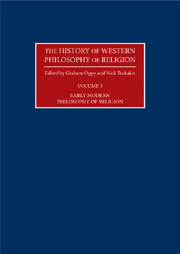Book contents
- Frontmatter
- Contents
- Editorial Introduction
- Contributors
- 1 Early Modern Philosophy of Religion: An Introduction
- 2 Niccolò Machiavelli
- 3 Martin Luther
- 4 John Calvin
- 5 Michel de Montaigne
- 6 Francisco Suárez
- 7 Thomas Hobbes
- 8 René Descartes
- 9 Ralph Cudworth
- 10 Blaise Pascal
- 11 Baruch Spinoza
- 12 John Locke
- 13 Gottfried Wilhelm Leibniz
- 14 George Berkeley
- 15 Voltaire
- 16 The Deists
- 17 Jonathan Edwards
- 18 Thomas Reid
- 19 David Hume
- 20 Denis Diderot
- 21 Immanuel Kant
- 22 Gotthold Ephraim Lessing
- 23 William Paley
- Chronology
- Bibliography
- Index
16 - The Deists
- Frontmatter
- Contents
- Editorial Introduction
- Contributors
- 1 Early Modern Philosophy of Religion: An Introduction
- 2 Niccolò Machiavelli
- 3 Martin Luther
- 4 John Calvin
- 5 Michel de Montaigne
- 6 Francisco Suárez
- 7 Thomas Hobbes
- 8 René Descartes
- 9 Ralph Cudworth
- 10 Blaise Pascal
- 11 Baruch Spinoza
- 12 John Locke
- 13 Gottfried Wilhelm Leibniz
- 14 George Berkeley
- 15 Voltaire
- 16 The Deists
- 17 Jonathan Edwards
- 18 Thomas Reid
- 19 David Hume
- 20 Denis Diderot
- 21 Immanuel Kant
- 22 Gotthold Ephraim Lessing
- 23 William Paley
- Chronology
- Bibliography
- Index
Summary
In many current textbooks in theology and philosophy of religion, ‘deism’ is used to refer to belief in a first cause who made the world but no longer exercises any providential control over it (that is, a deist believes in a first cause that is utterly non-providential). The labels ‘deist’ and ‘deism’ were much used in eighteenth-century European and American thought to refer to an active, albeit loose, intellectual movement. Belief in an absentee God was not the uniting, or even a prominent, factor among thinkers in this movement. The characteristic mark of deism is well brought out in Samuel Johnson's definition of ‘deism’ in his A Dictionary of the English Language of 1755: “The opinion of those that acknowledge God, without the reception of any revealed religion”.
Deism, so defined, turns around two notions of vital importance in the history of Western religious thought: revelation and reason. The deists, in various ways, attacked the ideas of revelation and revealed religion. The more moderate taught that revelation, while it is possible in principle and perhaps exemplified in the case of Christianity, can provide no surety for any religious truths that go beyond those that reason can discover. The more extreme taught that there is no such thing as genuine revelation. The notion that a God who is worthy of worship will seek to publish religious, saving truths via a revelation is absurd.
- Type
- Chapter
- Information
- The History of Western Philosophy of Religion , pp. 211 - 222Publisher: Acumen PublishingPrint publication year: 2009

